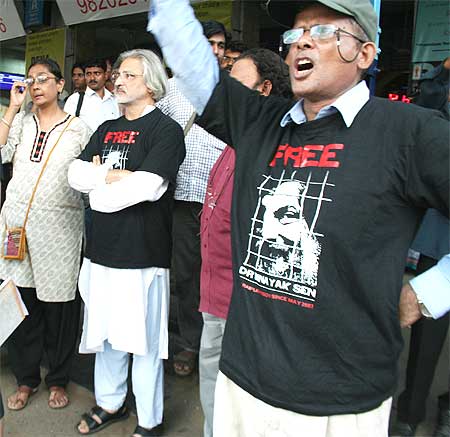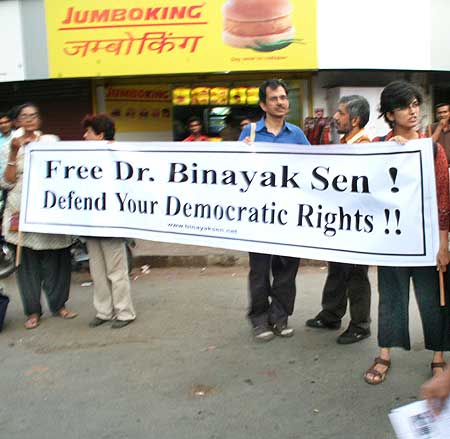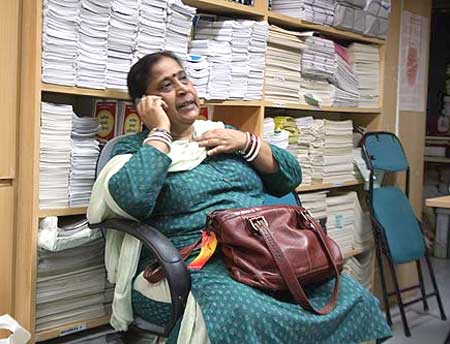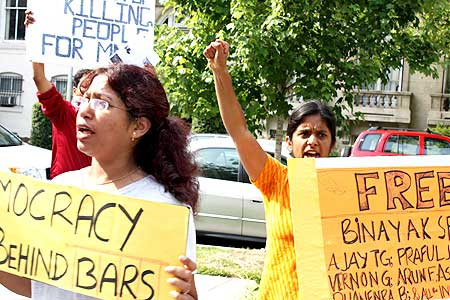 | « Back to article | Print this article |
'Dr Sen has got threats that whenever he comes out he will be killed'
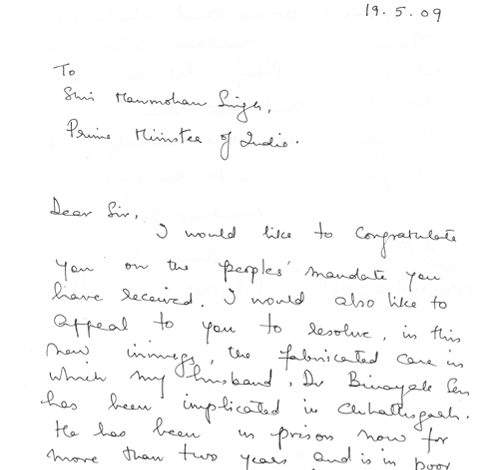 |
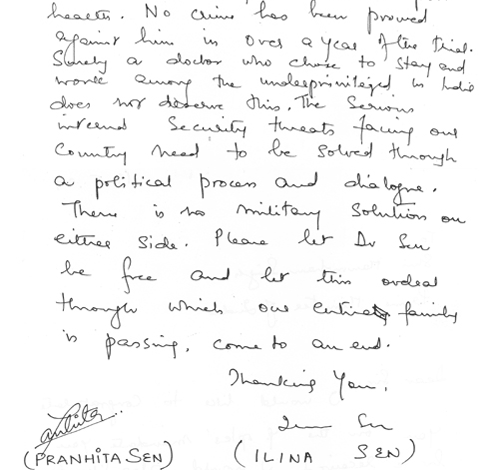 |
After spending 22 months in prison, human rights activist Dr Binayak Sen was granted bail by the Supreme Court on Monday.
Two years ago the award-winning doctor was arrested for alleged links with Maoists by the Chhatisgarh police under the dreaded Chhattisgarh Special Public Security Act 2005.
Despite a heart ailment, the state had denied him a specialist, and Dr Sen -- who spent his life tending to tribals -- remained in detention.
Twenty-two Nobel Laureates, ex-Chief Justice of India V R Krishna Iyer, Philosopher Noam Chomsky, hundreds of intellectuals and ordinary people have appealed for Dr Sen's release.
His wife Ilina Sen and daughter Pranhita have written a letter to Prime Minister Dr Manmohan Singh [reproduced alongside], urging him to free Dr Sen.
'No crime has been proved against him. Surely a doctor who chose to stay and work among the underprivileged in India does not deserve this. Please let Dr Sen be free and let this ordeal end,' they write in their letter [ ![]() Ilina's appeal to the prime minister].
Ilina's appeal to the prime minister].
As Dr Sen languished in prison, Ilina and her two daughters fought a battle outside, trying to do everything in their might to get him a heart specialist and to secure his release.
Today, as Dr Sen was granted bail, their crusade has borne fruit. Sen, who had been in custody since May 14, 2007, contended that there was no evidence against him to be booked under the Unlawful Activities (Prevention) Act, 1967.
Prasanna D Zore and Uttam Ghosh met Ilina and Pranhita on May 19, a few hours before they were to leave for Morocco to address a human rights conference. The duo spoke about the family's trial over the past two years.
How serious is Dr Binayak Sen's heart condition?
Ilina: We will only know after a thorough check-up. It's impossible to know, to assess otherwise. The ECG has shown that there is an arterial block but we don't know as yet how serious is this blockage.
'Once the government gets its fangs into you, it's very difficult to extricate yourself'
What is the current status of the court case?
Ilina: Till now about 69 witnesses have deposed and about 20 have been tendered. So out of 113 witnesses 90 have deposed in the court. The prosecution's witnesses are mainly police witnesses but then there are documents, computers and if the defence wants to put their own witnesses.
At the pace with which things are moving I could say it will take another year before all the witnesses in the case depose.
When did you last visit Dr Sen?
Ilina: Yesterday [May 18].
And what did you talk about?
Ilina: We spoke about my trip to Morocco and what I will be speaking about there. But there was also a lot of tension in the jail because apparently somebody had called the Union home secretary from a cell phone from inside the prison. They were taking photographs of all visitors; even we were photographed. Some of the officials have been suspended. So it was not a very comfortable or peaceful conversation.
Did Dr Sen ever tell you that he has lost hope in the system or he will never come out of jail?
Ilina: No, he has never said that to me. Earlier we thought that it was a very simple case and will get sorted out fast. I don't see that confidence in him now as the case is still dragging on for more than a year. Also, he is not in good health.
But he's still strong. He feels he has been victimised. But he also feels that once the government, which is all powerful, gets its fangs into you, then it's very difficult to extricate yourself.'I always feel somebody is following me'
How is the family coping? Are you feeling demoralised?
Ilina: Not demoralised, because there is a lot of support. I don't think any other human rights person had so much of people's support. So in that sense we don't feel demoralised. But practically, it is very difficult because we are all separated. My daughters are now in Mumbai; I am trying to manage between my job in Maharashtra and the case in Raipur. So there is a lot of travel and pressure. Pressure of travel, pressure of just coping with this whole case. I hope this petty harassment ends soon.
Harassment by whom?
Ilina: By the police, basically. I know that all my phones have been tapped. I can feel it the moment I enter Chhattisgarh. My phone behaves very strangely.
Among other things the Supreme Court had given a notice to the state of Chhattisgarh returnable in two weeks. Now getting that notice served was so difficult, when my lawyer gave it to the public prosecutor he said it is not in his name. So he didn't take it. Then the notice was taken to the Ganj thana where the case is registered. There they made a big brouhaha that the CSP was actually on election duty. When he came back he said why should he receive it again. Finally I had to call up the SP. This way simple things become so difficult.
How is all this affecting you? How has life changed after Dr Sen's arrest?
Pranhita: I've always stayed in Chhattisgarh. I did my schooling and graduation from there. Now I am studying in Mumbai. Now whenever I go to Chhattisgarh I don't feel safe. I always feel that somebody is following me. The situation is a bit scary.
Do you feel a threat to your life?
Pranhita: Sometimes (laughs nervously). Because even my phones are tapped. They listen to every bit of conversation that I have with my friends.
Ilina: She also received a life-threatening letter.
Pranhita: Yeah.
How are you all coping with this as a family?
Ilina: We have a very strong bond but with time it becomes more difficult because one feels... I haven't had a proper conversation with my husband in the last two years. I meet him once a week for 30 minutes, often try to stretch it to 50 minutes, one hour. How much can you pack into that?
Private conversation with him has completely collapsed.
Do you give him all the updates on what's happening outside in his support?
Ilina: I try to give it to him. He doesn't get it from normal channels but I try to keep him connected. Because the hardest thing in prison, apart from the physical hardships -- which is the least part of the difficulties -- is that there is no proper communication. You don't know what's happening with your family, what's happening with your children.
Also, he is a doctor; even my father is a doctor. So I never had to go to anyone else for treatment.'Perhaps the police wanted to silence him and teach him a lesson'
How does he spend his time in jail?
Ilina: He spends it reading. Then he took permission from the jail authorities to give him a radio because he is fond of music. They bought him a new radio, which the superintendent kept it with him for a few days to check it.
Recently, because of the disturbances inside the jail, they have taken it away. Yesterday I learnt that it has been sent to the intelligence department for testing.
Testing for what?
Ilina: I don't know what they expect.
Pranhita: They are trying to check if it is catching the frequency that can help him communicate.
Ilina: I don't know what they are testing it for or whether they will plant something in it.
Who do you think is behind all this?
Ilina: I would think it's the police. He always kept a low profile. He didn't have any political enemies. What was he doing? He was doing human rights work. His work never posed any threat to anybody. Occasionally, he was also on the state's advisory committee on land reforms. There were arguments on how to carry forward those reforms. They may not have liked his style, but I don't think that would lead to this (his arrest).
But it's the police whose exposure of fake encounters, custodial deaths and exposure of the Salwa Judum that got him into trouble. Perhaps the police wanted to silence him and teach a lesson to him and all other intellectuals.
'There is a paranoid mindset where you are constantly looking for an enemy'
So it is the state of Chhattisgarh that is being vindictive?
Ilina: [Nods].
Do you have any hope of this ordeal ending?
Ilina: I know it will come to an end. But I am very scared as far as his health is concerned and the way the police is interfering with his treatment options. I really don't know. But I hope it will end soon.
Why would the Intelligence Bureau do this to Dr Sen?
Ilina: It's not only the IB but the state police. But the IB particularly in our state plays an important role. The state governor was a senior IB official as also our DGP. It is a paranoid mindset. There is a serious problem (of Naxalism). I am not denying that. There is a serious problem of Maoism, Maoist crimes. While the Maoists have been killing junior officials and the police in turn are killing innocent adivasis, our society has been fractured actually.
But there is this paranoid mindset where you are constantly looking for an enemy and the distinction (between who supports Naxalism and who does not) disappears. And the fact that there are grey areas where people can see there is a problem and feel that there are other ways of solving it.
There is a perception that people who are human rights activists see only one side of the picture, they don't protest when policemen die as you mentioned. Do you sympathise with the family of those policemen who die in Maoist attacks?
Ilina: Of course, of course, of course. I have my sympathies with the family of Krishnakumar Netam, a constable who was blown up in Maoist attacks. I run a school for tribal children where many of my children join the police force partly because there are not many employment opportunities available.
Of course, many of these students have died in Maoist attacks and my sympathies are with their families. And if an x,y,z person gets killed in a family then how can I consider his family different from mine. We suffer the same.
But the point is that there can be no military solutions. Both sides (the Maoists as well as the state machinery) have to realise this. Because the problems are rooted in a very deep sense of alienation and if the adivasis today are going with the Maoists it is because of their resentment and anger. How do you channelise this anger; first you have to understand this alienation, frustration and anger, and then think of a solution.
'When we fight, we, of course, fight to win'
In these two years have you ever felt that you are fighting a losing battle?
When we fight, we, of course, fight to win. If you feel that you will lose a battle then you don't fight.
Is there a danger to Dr Sen's life in prison, you think? Have you thought about the possibility?
Ilina: (Keeps quite for some time) I have thought about it. I have thought about it several times. If it happens it will be a very great personal tragedy but it will also be great tragedy not only for Dr Sen and his principles but also for the Indian State, for this country, which I love.
After our marriage we could have gone anywhere but we chose to stay in India and serve the people of this country. If this happens it will really mean the defeat of openness and fairness of the system. That will be a real tragedy and that should not happen.
Pranhita: Yes, I have thought about it. Even he has got threats that whenever he comes out he will be killed. For me the thought is very frightening.
Have you discussed this with Dr Sen? How is he handling this?
Ilina: Look, we are all humans and we all have to come to terms with the fact that we all are going to die one day. On the one hand we need to know this but there is no need to get unduly worried thinking about it.
What does it take to face so many hardships and yet carry on with your fight?
Ilina: First of all, I know that this is wrong. I believe that justice will be done. And the fact that the ordinary people of this country who are leading their own fight for justice are with him, gives us great courage.

